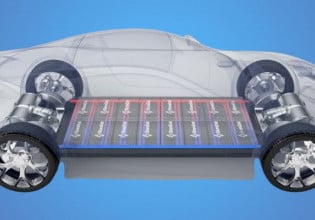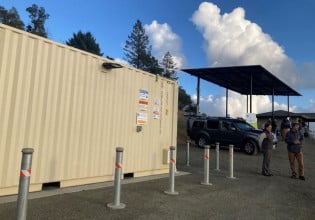Hydrogen-electric Truck Achieves 350-mile Range
British electric truck manufacturer Tevva recently announced a major range-testing milestone for its 7.5T medium-duty truck, featuring an onboard hydrogen fuel cell range extender.
In a freezing-cold drive from London to the border of Scotland, a dual-energy hydrogen-electric truck from British car manufacturer Tevva recently trekked 350 miles on a single charge. Throughout the range test, four engineers racked up a total of more than 620 miles in Tevva’s 7.5 metric ton (7.5T) prototype, which uses hydrogen fuel cells as a backup energy source for lithium-ion batteries.

Tevva’s 7.5T hydrogen-electric truck reaches the border of Scotland in a recent range-testing exercise. Image used courtesy of Tevva
Temperatures rarely exceeded freezing during the trip, which extended from Tevva’s headquarters in London to the United Kingdom’s border with Scotland in Berwick-upon-Tweed. The 350-mile range milestone occurred on the return home. In the first half of the journey, Tevva’s engineers stopped to refuel the hydrogen tank at a station owned by Element 2, a British company building the first network of hydrogen refueling sites across the U.K. and Ireland. It’s expected to cover all of Britain by 2027.
The hydrogen-electric 7.5T is expected to hit the market this summer. It builds on Tevva’s existing battery-electric vehicle (BEV) version of the 7.5T, which the company designed for last-mile and urban delivery customers. Initial deliveries launched last year for the product’s early customers, such as London-based postal service giant Royal Mail, home improvement and materials retailer Travis Perkins, and logistics firm Expect Distribution.
According to Tevva’s spec sheet, the BEV truck has a maximum range of 141 miles and an average of 105 miles. Comparatively, the hydrogen-electric version boasts a maximum range of up to 354 miles, averaging 265 miles. In both vehicles, the battery can charge to 90% in five hours; in the latter, refueling the hydrogen tank takes 10 minutes.
Video used courtesy of Tevva
Tevva’s latest range test comes a few months after the company put its BEV through wind tunnel testing with 40 different configurations, confirming that adding an aero roof and panels improves the drag coefficient by nearly 10%. Before that, Tevva’s BEV underwent extreme heat and altitude tests in Spain’s Sierra Nevada mountain range, climbing above 1.8 miles while fully laden with 4,400 pounds of cargo and stopping/starting on steep gradients. The tests ultimately showed no significant drop in performance, according to Tevva.
The company also ran tests in cold weather, driving 186 miles north of the Arctic Circle in Finland’s northernmost Lapland region.
Medium- to Heavy-duty Hydrogen Fuel Cell Market
Tevva’s customers have driven about 248,548 miles with its vehicles to date, according to its website. Early iterations of its trucks used a traditional internal combustion engine range-extender, but later, the company tweaked its technology to expand into the fuel cell electric vehicle (FCEV) market. Per Crunchbase data, it has raised $173 million from investors such as India-based multinational forging company Bharat Forge and U.K.-based venture capital fund ACF Investors.
After developing fuel cell- and BEV-based versions of its 7.5T, Tevva unveiled its first 19T hydrogen-electric model last September at a trade show in Germany. The company showcased its vehicle models with its existing customers, including U.K.-based logistics group Kinaxia Logistics, Italian transport services provider Codognotto, and French logistics firm FM Logistic.
Tevva is targeting the growing market for hydrogen-based heavy goods vehicles classified in the Class 5-8 range. This segment spans everything from Ford F-550 trucks to Freightliner Cascadia semi-trailer trucks to the battery-electric Tesla Semi. With “T” standing for tonnes (or metric tons), Tevva’s 7.5T model weighs about 16,534 pounds, while the 19T is 41,887 pounds.
As EE Power has previously covered, FCEVs’ characteristically low energy content by volume and limited energy storage capacity make them more fitting for commercial and industrial applications than consumer-facing light-duty vehicles.
According to the United States Department of Energy, FCEVs typically have a driving range of more than 300 miles and can refuel in less than four minutes.
Nearing Mass Production
Expecting high demand in the market, Tevva is ramping up its manufacturing capacity in preparation for mass production later this year. The company recently announced it secured regulatory approval for its battery-electric truck. The process involved 30 system tests to ensure its electric safety and electromagnetic compatibility met the latest standards.

Tevva is ramping up its production line in the U.K. Image used courtesy of Tevva via Twitter
The recent greenlight from regulators means Tevva can start selling in volume in the U.K. and throughout the European Union. Basing manufacturing out of its London headquarters for now, the company expects to sell up to 1,000 electric trucks in 2023. It plans to open a second factory in mainland Europe in the coming years, bringing its annual manufacturing capacity to 6,000 trucks by 2024.






